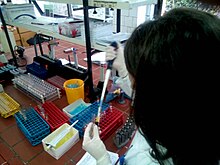
| Part of a series on |
| Biochemistry |
|---|
 |
Biochemists are scientists who are trained in biochemistry. They study chemical processes and chemical transformations in living organisms. Biochemists study DNA, proteins and cell parts. The word "biochemist" is a portmanteau of "biological chemist."
Biochemists also research how certain chemical reactions happen in cells and tissues and observe and record the effects of products in food additives and medicines.
Biochemist researchers focus on playing and constructing research experiments, mainly for developing new products, updating existing products and analyzing said products. It is also the responsibility of a biochemist to present their research findings and create grant proposals to obtain funds for future research.[1]
Biochemists study aspects of the immune system, the expressions of genes, isolating, analyzing, and synthesizing different products, mutations that lead to cancers, and manage laboratory teams and monitor laboratory work. Biochemists also have to have the capabilities of designing and building laboratory equipment and devise new methods of producing correct results for products.[2]
The most common industry role is the development of biochemical products and processes. Identifying substances' chemical and physical properties in biological systems is of great importance, and can be carried out by doing various types of analysis. Biochemists must also prepare technical reports after collecting, analyzing and summarizing the information and trends found.
In biochemistry, researchers often break down complicated biological systems into their component parts. They study the effects of foods, drugs, allergens and other substances on living tissues; they research molecular biology, the study of life at the molecular level and the study of genes and gene expression; and they study chemical reactions in metabolism, growth, reproduction, and heredity, and apply techniques drawn from biotechnology and genetic engineering to help them in their research. About 75% work in either basic or applied research; those in applied research take basic research and employ it for the benefit of medicine, agriculture, veterinary science, environmental science, and manufacturing. Each of these fields allows specialization; for example, clinical biochemists can work in hospital laboratories to understand and treat diseases, and industrial biochemists can be involved in analytical research work, such as checking the purity of food and beverages.
Biochemists in the field of agriculture research the interactions between herbicides with plants. They examine the relationships of compounds, determining their ability to inhibit growth, and evaluate the toxicological effects surrounding life.
Biochemists also prepare pharmaceutical compounds for commercial distribution.
Modern biochemistry is considered a sub-discipline of the biological sciences, due to its increased reliance on, and training, in accord with modern molecular biology. Historically, even before the term biochemist was formally recognized, initial studies were performed by those trained in basic chemistry, but also by those trained as physicians.
- ^ "Biochemist". Science Buddies. Retrieved 20 February 2013.
- ^ "Biochemistry & Biophysicists". My Plan. Retrieved 20 February 2013.